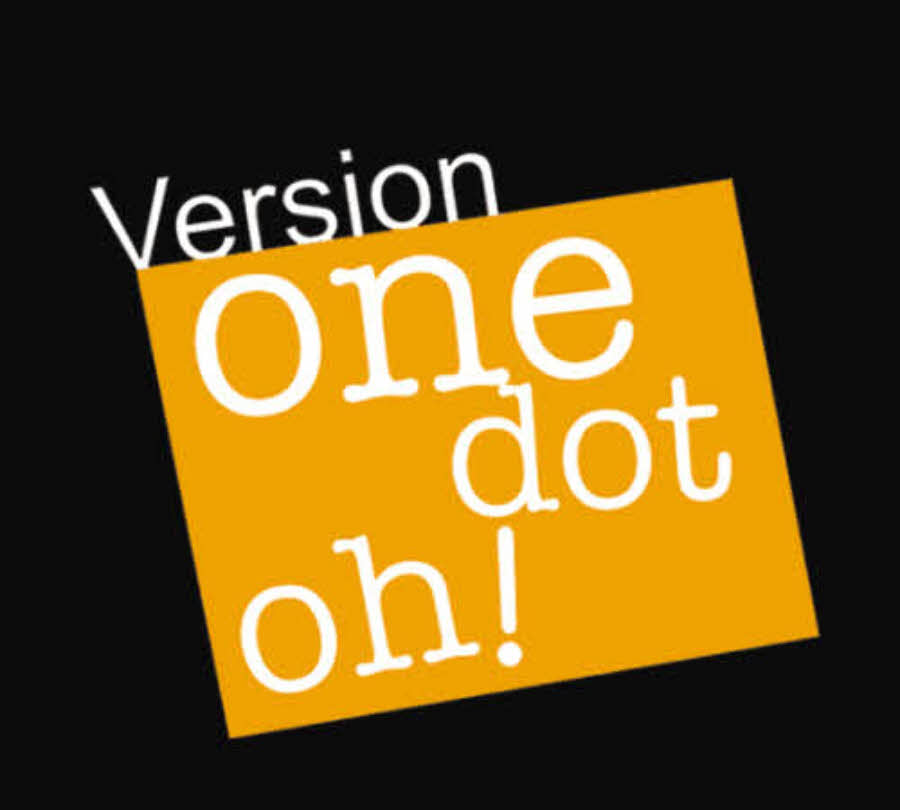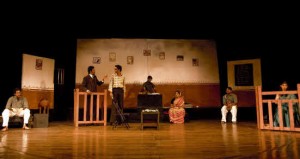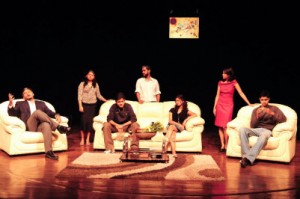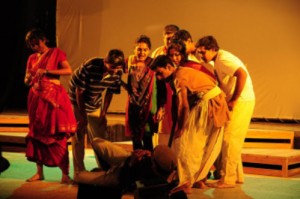All the world’s a stage, said Shakespeare. How true that is! It’s just that we are so caught up in our fast-paced lives, that we hardly realize the simple truth behind that profound line! Quite ironically, it’s these guys on stage, the theatre folks, who more often than not, remind us of our absurdities and foibles, making us laugh at our own gaps and sometimes tell us what we could have been. Entertainment, enlightenment and much more.
They don masks alright, but somewhere in between, the demarcation between the audience and the performers blur and the masks quite magically seem to melt away or disappear into thin air and one may sooner or later, begin seeing one’s own self in the performers on stage.
Such is the magic they cast on us.
When Srikrishna Sridhar Murthy, who envisaged back in 2002 what is now ‘Version One Dot Oh’ (VODO, for short) shared on Google Chat that he has poured his heart out in this interview and that it was all spontaneous, I was delighted. I assured him I would take care of the editing. But as I sat down to do up my task, I felt I would just stop with proof reading and let Krishna do all the talking with his genuine, heartfelt replies.
So, here, ladies and gentlemen, is a fun-filled interview with Srikrishna of VODO, a Bangalore-based theatre group with a funny name and a wonderful mission, which has achieved quite a big deal in the eight years of its existence, on the journey with VODO, creativity, team work, future plans and many more.
The first question would be about the behind-the-scenes story of VODO. How did VODO happen?
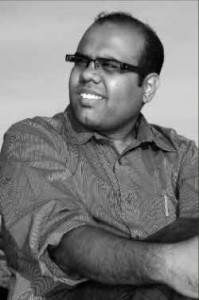
I had been involved in theatre since my school days and especially during my time in BITS, Pilani. When I started my career in 2002, I got interested in the theatre scene in Bangalore and began watching plays here. One of the plays I went to watch was “Silence, the court is in session…” by Vijay Tendulkar at Alliance Francaise. As I watched the play, I was reminded of how we used to put up such good shows on campus with such limited resources (BITS is in a village!). I walked out of the auditorium that day thinking that I would start a group and continue to do theatre. I called some friends from BITS who had also done theatre on campus and they called some other friends and towards the end of 2002, we managed to put a very small show for only our friends and families.
The group slowly expanded, and we started doing some play reading sessions in Cubbon Park, with the hope of putting up a public performance. One of the plays we read during these sessions was “Can’t pay! Won’t Pay!” by Dario Fo and we were all in splits during the reading (I still believe that it is the most hilarious play we have read/performed). We decided to put this up as our first public performance and we planned for our first ‘auditions’.
What followed were eventful months of rehearsals and more importantly having fun, which I strongly believe built the culture at VODO. We finally put in some money and decided to perform the play in an auditorium in December 2003. We wanted support in production, ticket sales, backstage etc. and we got many of our friends to join the group and be part of the crew. The entire cast and crew had people from technology, law, architecture, performing arts and other backgrounds.
As we prepared for the show, we realized that we needed a name for the group, a ‘banner’ to perform under. Ideas started to flow from all directions. Some good and some very weird names were brought on the table. ‘Hickety Pickety’ was the funniest one on the cards, inspired by the children’s home where we rehearsed, but the women in the group didn’t think it was cool enough! Then, basically desperation and some of our software engineer minds came together and we agreed on the name “Version one dot oh!” and thus was born our group.
The first few shows were memorable in more than one way, what with some brilliant performances to major goof-ups and rats attacking our props overnight! However, the feeling of an audience applauding the performance made all the effort completely worth it. The cast party that night went on for a long time and I saw how happy and kicked the team was. I decided that day that I would do a lot more of this!
I guess everyone in VODO is balancing a full-time job and a creative passion. Do you think you are able to do justice to what you have established and sustain it? How do you manage to give VODO the time it may need?
Theatre is like any other passion or hobby that you might have and I think we all need to have time to follow a bit of our passions. Theatre helps all of us to relax and get away from regular work, spend more time exploring new characters, be creative and free and most importantly express ourselves. Once you get on stage you want to stay there! We have sustained this over a period of 7-8 years now and have performed over 80 shows of 14-15 productions, across multiple cities. VODO has touched the lives of many cast and crew and also thousands of audiences. I definitely think we can sustain this and an interesting way of doing that is to continue to try new things. We have now started using live music in our plays and doing our own make-up in most of the cases. We next want to explore multiple genres that we have not tried and also try and learn the art of building sets of our own. We also want to write our own scripts soon.
We are extremely open to bringing in new people into the group and this adds tremendous amount of fresh energy, ideas and creativity and ensures that we do not stagnate as a group.
How does it feel to be able to create something on your own? What do you feel are some of the best points of being able to create your own play? What do you think are the challenges?
It feels absolutely wonderful to create anything on your own, be it your first C program or a play! I think putting together a play can be intellectually very challenging and as a director or as an actor there’s a fantastic opportunity to express oneself. Theatre is also about adapting to an audience and different auditoriums, because each show is different and every audience reacts very differently to the same play. This again gives us a very good opportunity to evolve a play and once you get comfortable you can try and improvise on it.
As a director, I’ve really enjoyed bringing the script, music, lights, sets etc. together and narrating a story in a way that connects with the audience. There are many times when things don’t go as planned and all that too gives you a great reason to have a good laugh at the cast parties.
Putting up a play can also be extremely challenging. Given that all of us work in different sectors, getting people to come together to rehearse is itself an interesting optimization problem! Bangalore, like most other cities, has very few rehearsal spaces which makes things more difficult. We also don’t do theatre for any commercial gain and hence we need to be careful of our budgets, optimize on resources and ensure we sell as many tickets as possible to cover costs. Since we thoroughly enjoy putting up plays, we would do anything for a few laughs and a bit of applause.
What does it mean to work together as a team? Do each of you work on specific roles or do you sort of take turns in a cycle? How exactly do you coordinate ideas? Do you discuss and dispute often?
One of the things that we are proud of at VODO is that we come together as a team in all productions and try to give our best in all ways. People take a lot of ownership in the tasks assigned to them and go the extra-mile to make things happen. We do try to be as organized as possible, but it is more important to have fun and enjoy what you are doing as that is the core of why we all do theatre. People play multiple roles depending on their interests and move from one department to the other, which also helps us all to be full of ideas and understand how the entire production works. There is a lot of debate in VODO about ideas and we almost always do a feedback session after every run-through or a show, to see what went wrong and how we could improve for the next show. We also take the feedback from our audiences and critics very seriously and have always tried our best to act upon them.
How long does it usually take to work on a play – from concept to scripting to production to staging? On an average, how many new plays do you guys do in a year?
We still have not conceptualized or scripted our own plays yet. We definitely plan to do so in the near future. We usually pick plays of well-known authors, both Indian and western, and try to produce them, sometimes adapting them in our own way as well. It usually takes about 2-3 months to put up a decently long play and we tend to produce at least 1 or 2 productions every year. We typically perform a play 6-8 times every season it is produced.
What does creativity mean in the context of acting? Where do you think creativity comes into picture in enacting a role?
Before I answer that, I want to clarify there is a lot more to theatre than just acting, including set design, music, lights etc. Yes, acting is the most important part of theatre.
There are different schools of thought on how an actor should prepare and bring out the character, and different actors in our group prepare differently. As a director, I’d love to have the actor choose how he prepares for a role, though we do some common exercises. Creativity starts in your interpretation of the character and making up things about the character that are not explicitly brought out by the playwright. You then need to execute your thinking through a performance, which requires a lot of experimentation and practice. As an actor you usually know when your interpretation of a character is demonstrated through your performance, and you know when you have got it right. It is a great pleasure when the audience also knows it and acknowledges it!
We also tend to adapt plays and improvise them beyond what the playwright intends us to do. This is a lot of fun and also demands a lot of creativity from the actor and the director.
Can you tell us about some of the most defining events in VODO’s journey?
VODO’s “Shadows in the dark” by Sriranga won the Best play during the Young Director’s Theatre Festival in Bangalore in 2005 and in the next year we were invited to perform the play in a festival that marked the 50th anniversary of Karnataka, with five other premium and old theatre groups of Banglaore. VODO’s performance was rated as the best in the festival by newspapers like The Hindu.
One of the most heartening experiments at VODO was our trip to Dharwad where we went to perform two plays of Sriranga, one of the most brilliant playwrights in India. Dharwad was the hometown of Sriranga and the people there had seen his plays performed many times over the last few decades. We were performing his plays there for the first time in English and we had some of his oldest friends and associates in the audience. The reception and feedback we got from the audience for the two plays was extremely encouraging and was one of the most satisfying performances of VODO.
VODO’s “Silence, the court is in session…” was invited to perform at the KalaGhoda festival in Mumbai and the audience was packed and the performance was highly appreciated.
Finally, what does VODO aim to achieve in the years ahead?
After all these years of experimenting, I think we should stick to our core and enjoy ourselves. We are an amateur theatre group of professionals from different walks of life coming together for the love of theatre and we should continue to stick to that. We will definitely experiment with newer techniques, newer genres, write our own scripts, include more people as part of the group, run theatre workshops and reading sessions and hopefully spread drama to as many people as we possibly can, while we continue to have lots of fun putting up plays and partying!
Pics Courtesy : VODO
